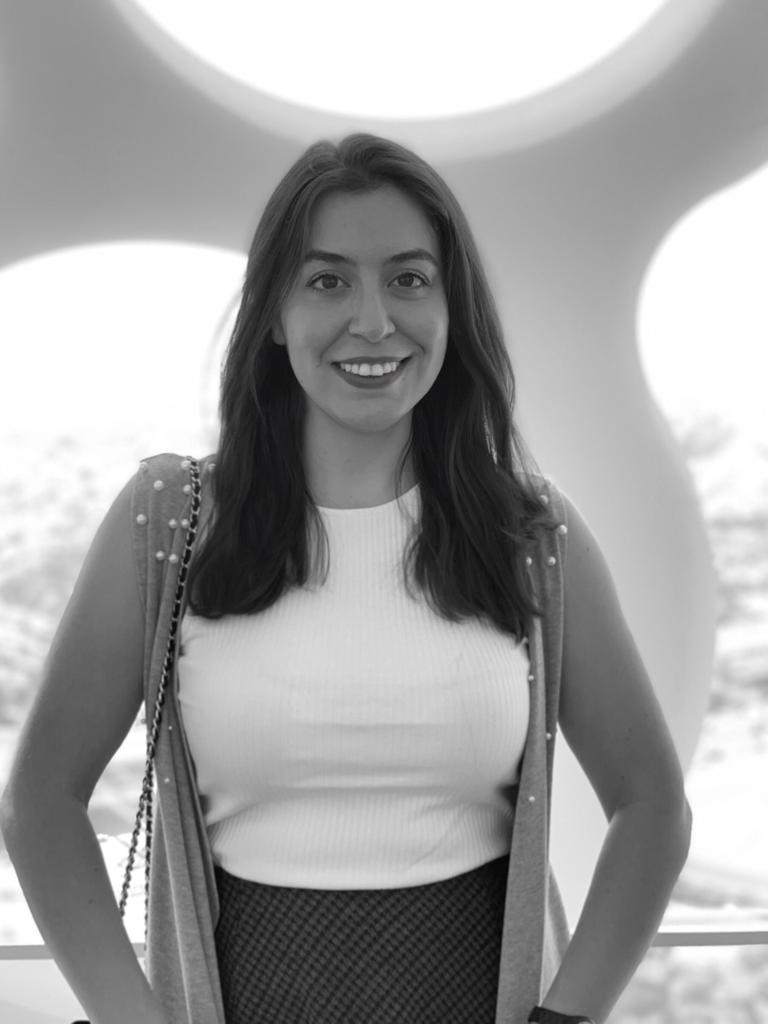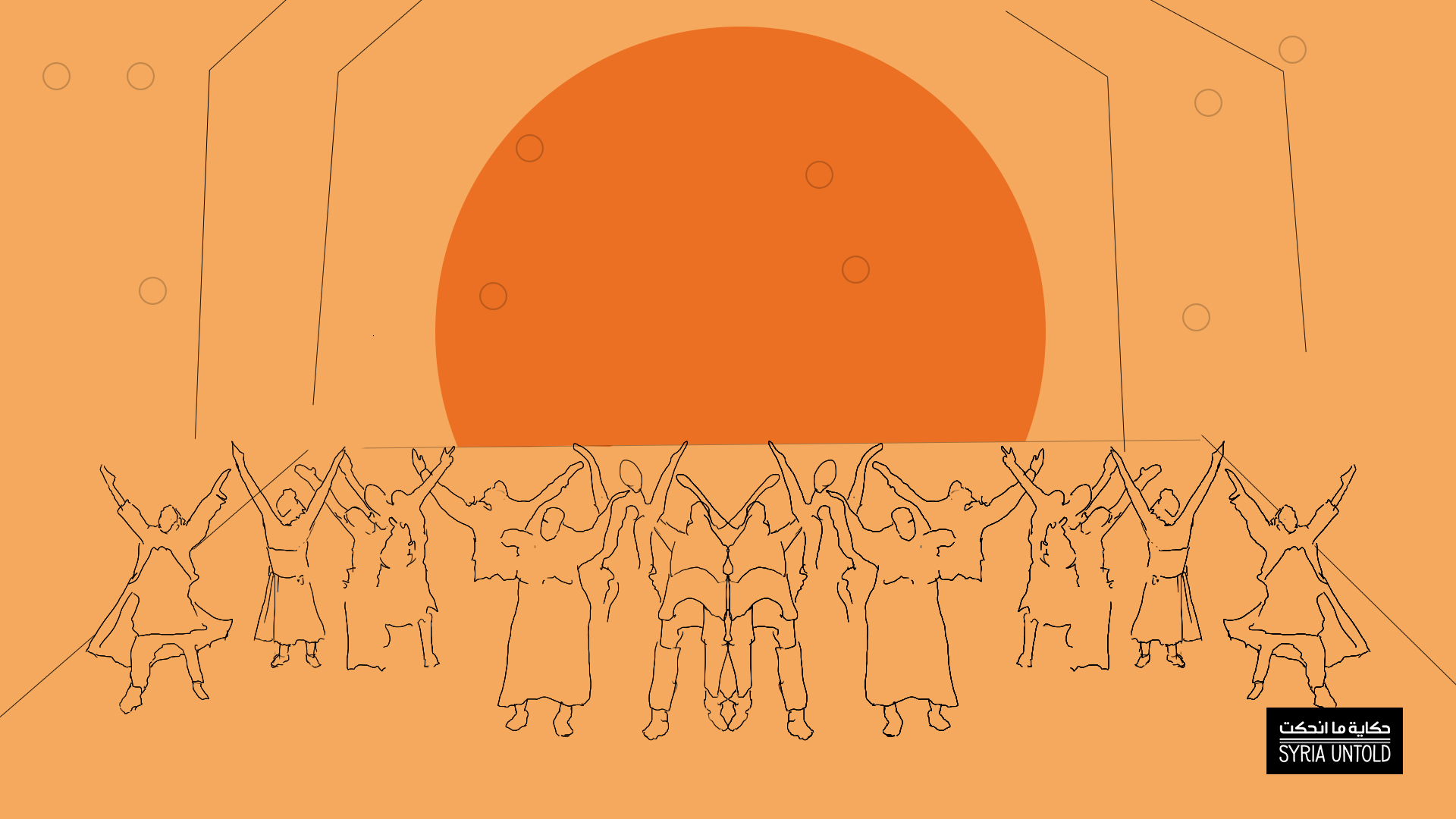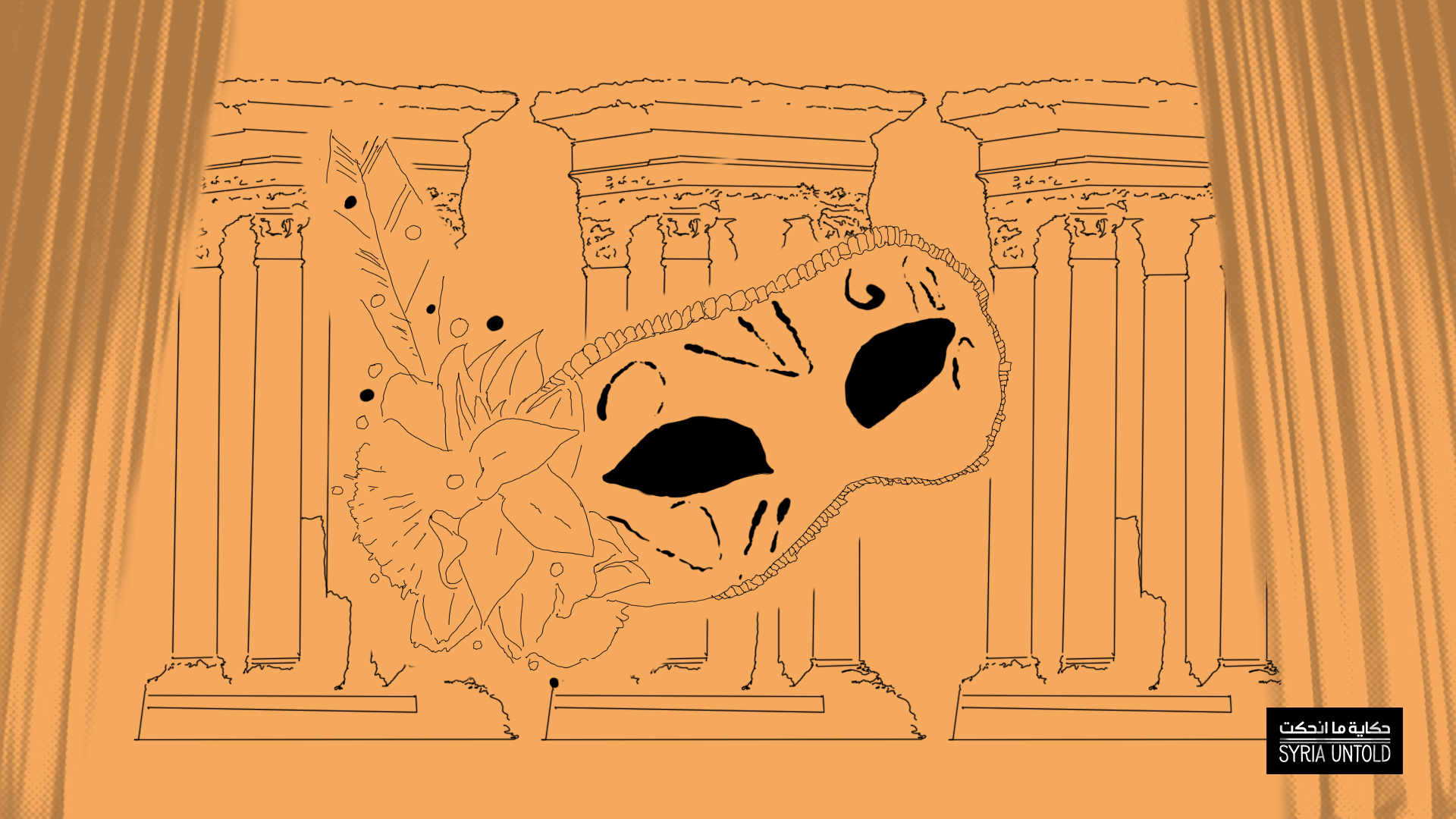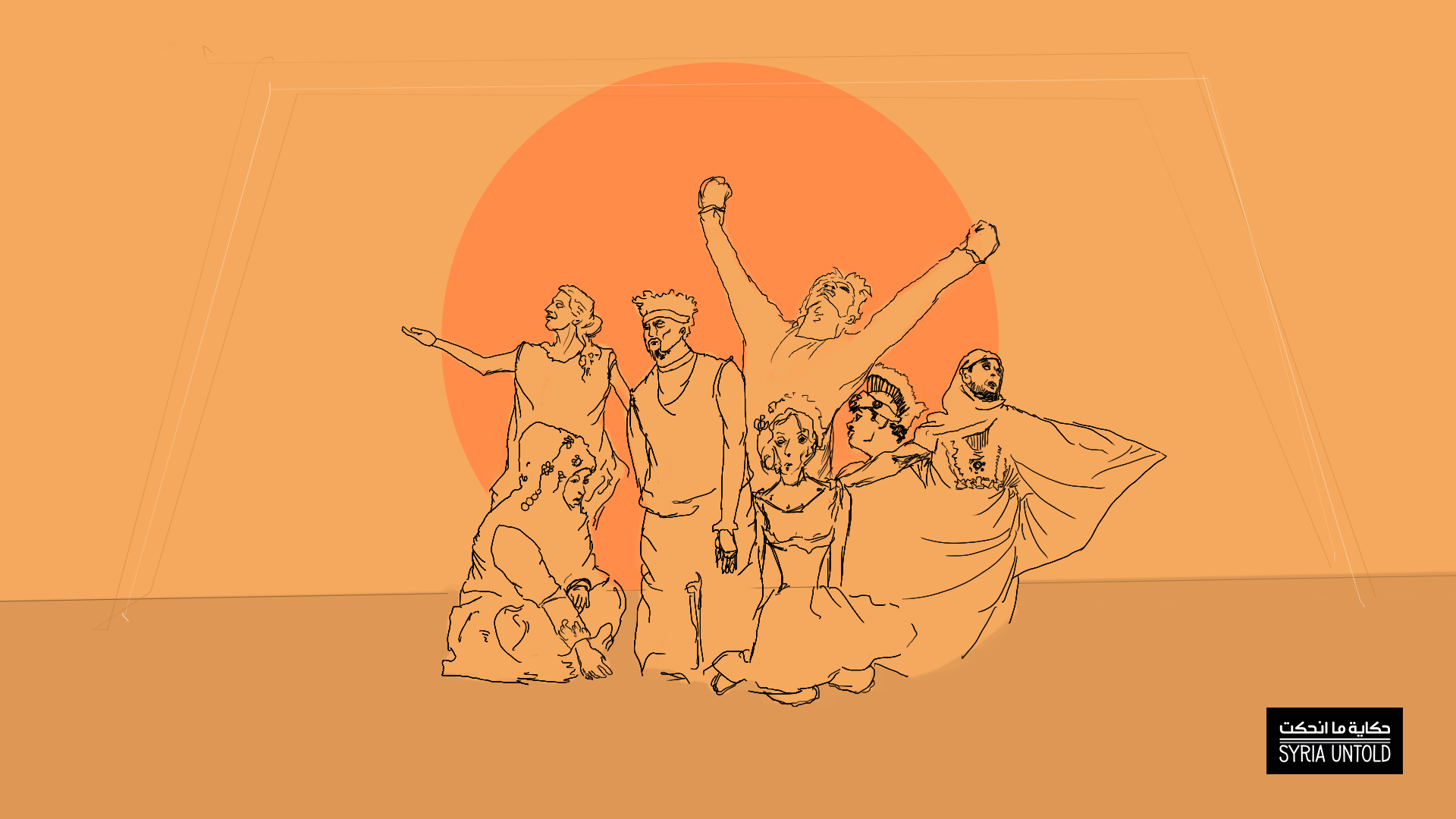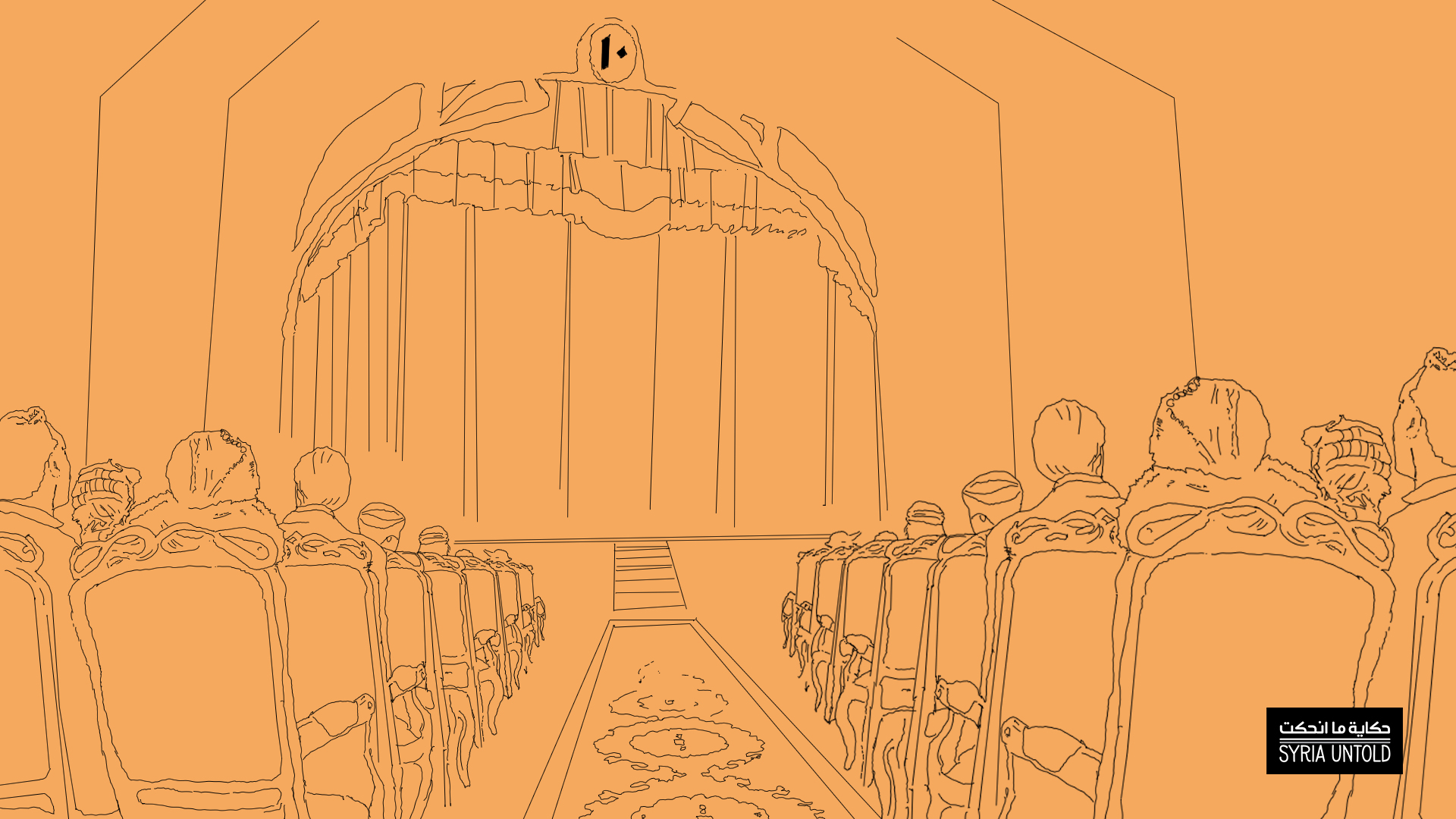This essay is part of SyriaUntold's series on Syrian theater. Read this piece in its original Arabic here.
Six years ago, Angela Merkel announced an open-door policy in Germany, as asylum seekers fleeing war were allowed to enter German territory. Consequently, hundreds of thousands of Syrian refugees were registered in Germany, apart from immigrants who arrived from Syria and were registered as students or workers in the country.
Syrian asylum entailed complex issues that are not only related to the legal existence of refugees, but also concern German society and state institutions at all economic, social and political levels. Most of these issues were exemplified by the fight against the rise of the extreme right, the confusion in the implementation of integration plans, and all the ensuing problems of identity politics and the post-colonial German-European perception of immigrants and refugees.
These issues have affected the German cultural scene as a whole, as German theaters managed to keep pace with the political and social climate. The theme of Syrian refugees occupied many plays, as theaters in small and large cities opened their doors to Syrian theater makers. State-sponsored and independent cultural institutions funded plays addressing the theme of asylum in a bid to integrate artists into their new societies, and also because of the German public’s need to know, hear and see who these newcomers were.
Despite the successive violent events and the psychological and other experiences that Syrians underwent in Germany, they were able to play an active part of this cultural scene. They formed theater collectives and partnerships, and we began to witness a Syrian theatrical movement in Germany. When documenting and examining the aspects of this theatrical activity, one can identify a large group of Syrian theater makers, but the question that arises in this context is: How can a work of theater be classified as a Syrian?
A Syrian play or a play about Syria?
Two years ago, I discussed this question in a research project that tackled the theme of asylum in Syrian-German theater. I recalled all the plays directed by Germans that dealt with asylum and immigration with Syrian and German actors, or vice versa. When the director or writer is Syrian and the team is German, or in other cases where the entire team is Syrian but the producer is German, the Syrian writer has been identified as a standard solution to classify a play as Syrian.
How can a work of theater be classified as a Syrian?
However, this answer is a temporary solution to a question that is becoming more complex over the years for several reasons, the most important of which is the involvement of Syrian writers in German life and society. The cultural identity of these writers is expanding in a way that makes it impossible to boil it down to just “Syrian.” Such writers are now learning German, which may be the new language of their future plays instead of Arabic. Their choice to address themes that are not directly related to the Syrian situation may also alter the identity of these plays. Would this reduce the “Syrian” character of a given play?
It is seemingly difficult to find a specific and clear answer that regulates the classification of Syrian theatrical works in Germany. In the coming years, the question itself may be irrelevant as it becomes increasingly difficult to separate what is Syrian from what is German. Still, it remains a research question related to deeper meanings as far as identities and politics are concerned.
Current conditions of Syrian theater
28 May 2021
How are you, my theater maker friend?
Before delving into the plays in which Syrian artists in Germany have created and the meanings of artistic expressions since 2015, it is necessary to first take a close look at the status of Syrian theater makers in Germany and their daily living conditions. Such conditions are closely related to the practice of theatrical art and reflect the nature of artists’ work and production.
Even in optimal circumstances, immigration in general entails great difficulties. But in the case of Syrians the matter is even more difficult, as the decision to seek asylum or to emigrate is far from optional. Rather, for most Syrians it is forced, as the country from which they were displaced is still witnessing war. There is no possibility to visit home in the near future, let alone return. This is not to mention the psychological and emotional trauma that has shaken the existence of a large number of Syrians over the course of the last decade and changed their personal and emotional stability. They are asked to lead new lives, learn German, look for a new job, search for a new home and find new social safety nets all handling bureaucratic transactions.
This may be a brief description of the difficulties faced in asylum. However, Syrian theater makers also weather these storms on a daily basis, and they are among the most vulnerable groups in times of crisis due to the difficulty of achieving stability and financial independence. Psychological and material instability affect the theater work itself, even if this is not clearly exemplified. This instability is felt in the production conditions and how the artists adapt or find solutions. This is part of the hidden work process.
In the past six years, Syrian theater makers in Germany have found themselves forced to work outside the social context in which they developed their profession. They lost a great deal of the homogeneity of the Syrian audience, with whom they had a shared social context and language, among other cultural components. They started discovering new institutions and theaters as well as legal and institutional forms that are different from those under which they previously worked, thus facing new issues and questions they did not have answers to and in which they were personally involved.
Overview of Syrian theater work in Germany
Artists were able to cope with these challenges with the help of companies formed within German theaters, or through collectives and independent partnerships. Chief among these groups was the Open Border Ensemble within the Kammerspiele Theater in Munich, which was founded in 2015 with the contribution of the Syrian dramaturg Rania Melehi. The group subsequently included the actors Kamel Najma, Majd Fiddah and Kinan Hmeidan. They presented, among other shows, the performance Damascus-Munich in 2018.
The Exil Ensemble, which was established in 2016 at the Gorki Theater in Berlin, included a group of actors from Syria: Mazen Aljubba, Ayham Majid Agha, Kenda Hmeidan and Hussein Al-Shatheli. The ensemble presented a series of plays that touched on the themes of asylum and the Syrian war through a multi-national team, bringing together Germans, Syrians and others. These shows included Winter Journey (2016) and Skeleton of an Elephant in the Desert (2017).
In 2017, Collective Ma’louba was founded by a group of Syrian playwrights and actors in Germany and France, including Mudar Alhaggi, Wael Kadour, Amal Omran and Bayan Jaratli. Their productions included The Great One (Ya Kebir, 2018) by Rafat Al-Zakout and Amal Omran, Your Love is Fire (Houbak Nar, 2017) and Days in the Sun (Ayam fi al-Shams, 2018) by Mudar Al-Hajji, and Reine Formsache (2020) directed by Wael Ali, with Rania Mleihi as a dramaturg. Their most recent play Overdose - The Unfinished Show of Pain and Joy (2021), performed online, was written and directed by Fabian Lettow, while Waseem Alsharqi worked on the dramaturgy.
It was as if they were attempting to capture the memory before it dissipated into the life of asylum and new societies.
The Tanween Theatre and Dance Company, which was founded in 2009 and moved to Germany in 2013, performed Destruction for Beginners (2016-2017) by the choreographer Mey Saifan, and Please Repeat After Me (2018) by writer and theater director Ziad Adwan.
Outside the framework of theatrical groups, a collection of plays by Syrian playwrights or directors have been produced since 2015 and presented in Arabic and German, such as The Trip (2015) by playwright and director Anis Hamdoun in the city of Osnabrück, and Media (2018) directed by Wahad Soliman in Oberhausen.
The partnership between the playwright Mohammad Al-Attar and director Omar Abu Saada also resulted in a set of plays such as While I Was Waiting (2017), Iphigenie (2017) and The Factory (2018), which were performed both in Germany and elsewhere. Playwright and director Wael Salem also worked on the play Reading Between Faces (2019) after a training workshop with a group of young people in Berlin who were not theater professionals.
Perhaps among the last theatrical activities held before the theaters were closed due to the coronavirus pandemic was the Qaf project, with support from the Barzakh Foundation and founded by Ghassan Hammash. The project presented a series of theatrical readings of scripts in both Arabic and German, and it included a wide variety of Syrian theater makers.
Emerging Syrian theatrical experience in Europe
14 June 2021
Syrian theater through a decade of war
01 June 2021
This overview is not to be deemed as a map of all the plays that have been performed over the last six years, or a comprehensive documentation of all theatrical experiences of Syrians in Germany. There are certainly many other experiences in other cities and within different frameworks. Such experiences include theatrical activity within schools, camps or workshops. Also, this documentation does not include the theatrical activity of Syrians within German theater groups or performances that did not address the themes of war or asylum.
What is diaspora theater trying to tell us?
Most plays performed by Syrians in Germany after 2015 were concerned with topics related to Syrian asylum and its underlying issues. Some of these plays attempted to accommodate and embrace recent memory by tackling events that unfolded after 2011 in a bid to restore them and reproduce them on stage. It was as if they were attempting to capture the memory before it dissipated into the life of asylum and new societies.
Some plays, especially those that were performed in the early years of asylum, would cling to asylum as a political and social event. Asylum ceased to be a mere legal status for Syrians, as it turned into an identity with special features and aspects that went beyond a legal denomination. It had meanings that referred directly to certain social, economic or psychological conditions.
Those who attended plays in Germany after 2015 will realize the difficulty of dissociating from the two themes of asylum and memory, and all that is going on around the theater makers in terms of war, detention, the journey of asylum and the bureaucracy and subsequent difficulties.
Therefore, trying to recall events and give an overview of what happened constituted the main gateway to introducing the German public to refugees. This is how refugees derived their asylum legitimacy, as they explained what was happening back home and why Syrians have sought refuge in Germany. There was also an urgent need to preserve the Syrian narrative and protect it from being erased or forgotten, all while emphasizing that a refugee or migrant has roots, a family and a complete life from before asylum and war.
As for the plays that more closely reflect the present moment and the current life of Syrians, their current activities, their daily stories and their love and family relationships in new societies, they are still somewhat limited compared to the plays tackling asylum and memory.
Theatrical scripts have also been affected. The first aspect of this that can be seen is the absence of fictional stories in a wide range of plays. Among the Syrian plays performed in Germany, we rarely see fictional characters who have no direct relationship with the creators of the play. Also, the origin of drama in these plays often stems from the tragedy of the real Syrian event, rather than between the characters themselves.
I (the writer) or I (the director) or I (the performer) are the most important elements in a large number of plays. In other words, personal stories abounded in these plays over the past five years. Most of their scripts took the form of long monologues addressing the audience first, before the characters appeared on stage—especially in plays where actors engaged in the social context or came from Syria. In such cases, the theatrical dialogue diminishes and turns into a direct speech addressing the German audience first. Perhaps the most obvious examples are plays based on self-testimonies or plays whose primary purpose is to reveal a personal story with the aim of recovering from it, or even presenting war and collective asylum from the point of view of an individual. This is what imposed the form of disjointed and multi-voice stories and the attempt to bring in non-professionals into theatrical work. On the other hand, through storytelling, Syrian theater served as an alternative space to impart knowledge about what was going on.
Walking a tightrope
Six years into their lives in Germany, Syrian theater makers are now facing challenges related to the essence of theatrical work. Many of them find themselves needing to locate balance points to walk the tightropes.
The time has probably come to open up to contexts that are wider than the Syrian one, without completely dissolving into them. The time has also probably come to engage with the present and the post-asylum reality without being stripped of the memory, which is still the most important component of the individual and cultural identity.
It is also important to target the Syrian audience in Germany, taking into account that the majority of spectators may be German. Communication and networking with German theater institutions and companies is also needed while preserving contact with Syrian theater that is performed inside Syria. This is among other complex dualities that Syrian theater in Germany may have to cope with and balance in the next stage. This stage emerges in the wake of theatrical productions that relied in large part on reminiscences and self-reflection after the war and asylum.


